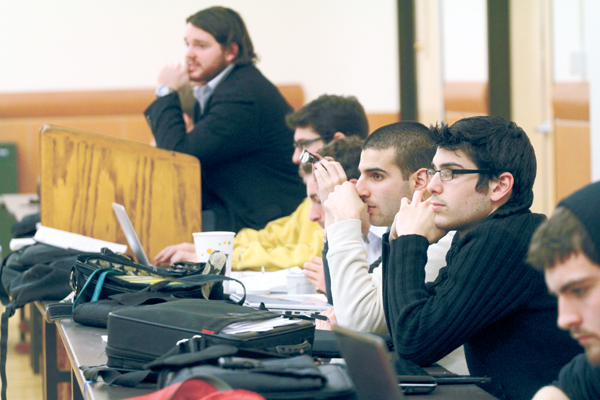
The Binghamton University Student Association moved one step closer last night to establishing itself as a corporation and declaring its legal and financial independence from the University in what could be the most significant shakeup of the student government in several decades.
The SA Assembly voted Monday night to approve a new constitution put forward by the Executive Board, giving the go-ahead for a campus-wide referendum in which all BU undergraduate students would decide whether to approve the constitutional changes.
The changes consisted of two main parts. One was a declaration that the SA would become an independent not-for-profit incorporation, and the other was a revamped structure of student government that would replace the system that is currently in place.
Incorporation would give the SA increased independence from the University, according to the SA leaders behind the initiative.
“It makes the line between the University and the SA a lot clearer,” said Randal Meyer, the speaker of the Assembly.
He explained that incorporation would give the SA more freedom to enter into public-private partnerships and would protect members of the E-Board from individual legal responsibility if a lawsuit were ever to be brought against the SA.
If students approve the constitutional referendum that will be held on April 12 and 13, the Assembly — the SA’s legislative body — would be dissolved and replaced with a new body.
This new body, the Representative Council, would be composed of 11 representatives — five E-Board members and six other popularly elected representatives . There would also be three sub-councils — the Financial Council, the Rules and Governance Council and the Student Outreach and Advocacy Council. There would be a total of 51 additional representatives on these sub-committees, elected from the various residential communities and from off campus.
But some who were opposed to the changes were concerned that the new constitution gave the E-Board too much of a hand in the legislative process.
Ryan Stempien, an Assembly representative for Hinman College’s Roosevelt Hall, spoke against the constitution Monday night.
“I don’t see a separation of power,” he said. “I don’t see equal power within those branches … I don’t see communication with the Committees.”
George Hadjiconstantinou, vice speaker of the Assembly, also spoke out against the changes. He focused on the time frame since the introduction of the changes.
He pointed out that there have been “15 days to consider this new constitution. Has it been enough for each and every one of you to bring to your constituency?”
But Kaitlyn Flatley, an Assembly representative for Off Campus College Council, said that it was. She pointed to the multiple meetings of the Inter-Cultural Awareness Committee and several public forums, including community and hall meetings, as ample opportunity for representatives to discuss the changes with their constituencies.
Flatley, speaking to representatives, said that if students failed to understand the changes, “that’s your fault, then you failed to do the job that you were elected to do.”
Madeline Stolow, an Assembly representative for OC3, also said that the timeline was too short.
“There needs to be more people involved in this,” she said. “I think there needs to be a longer process.”
Daniel Rabinowitz, SA vice president for academic affairs, denounced allegations that the E-Board was acting in its own self interest.
“To the average student, everything we do here is corrupt,” he said. “If it’s corrupt, they’ll vote it down and that’s it.”
After three rounds of debate, the Assembly voted 24-7 in favor of sending the new constitution to a referendum.
Jenna Goldin, SA executive vice president, said she was “pleased” with Monday night’s outcome.
She said, however, that if the referendum fails, she would likely not bring up the issue again this semester.
“It’s up to the next year’s Executive Board,” she said.
Stempien said he would still like to see the proposals fail in the referendum, but said he hopes it would be introduced next year in a different form. He expressed concern that the present wording of the ballot question did not sufficiently describe the full implications of the changes.
“The current wording … is pretty vague,” he said.
Stempien also said he was unsure whether students would have a thorough understanding of what they will vote on next month.
“Some students are involved, some are not,” he said.
Milton Chester, the director of student conduct and the assistant dean of students, was present at the Monday night meeting.
Though Chester said it would be inappropriate for him to share his personal stance on the issue because he did not want to sway students’ opinions, he did offer some general comments.
“I’m still trying to understand what a lot of the changes could mean,” he said.


